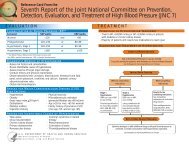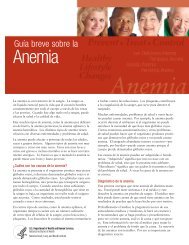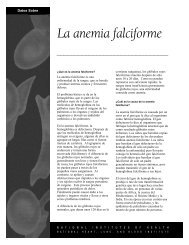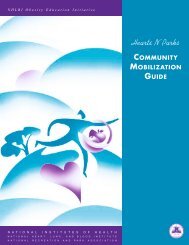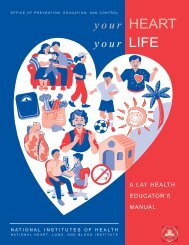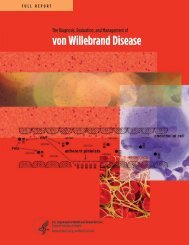WOMEN 'S HEALTH AND MENOPAUSE : - National Heart, Lung ...
WOMEN 'S HEALTH AND MENOPAUSE : - National Heart, Lung ...
WOMEN 'S HEALTH AND MENOPAUSE : - National Heart, Lung ...
You also want an ePaper? Increase the reach of your titles
YUMPU automatically turns print PDFs into web optimized ePapers that Google loves.
The atherogenic risk profile of older women is<br />
appreciably more adverse than that of younger<br />
women, although it is uncertain whether age or<br />
hormone status is the primary determinant of<br />
the evolution of the adverse risk profile.<br />
• Large randomized, placebo-controlled clinical<br />
trials have shown that beta-blockers, aspirin,<br />
3-hydroxy-3-methylglutaryl-coenzyme A<br />
(HMG-CoA) reductase inhibitors (statins),<br />
and angiotensin-converting enzyme (ACE)<br />
inhibitors reduce risk for CHD events in women<br />
as well as in men [A]. For some of these<br />
therapies, the evidence derives largely from<br />
secondary prevention trials; in general, therapies<br />
that work in secondary prevention will work<br />
in primary prevention as well. Treatment effects<br />
appear to be similar in women and men. For<br />
example, meta-analysis of data from several<br />
major lipid-lowering statin trials showed a<br />
29-percent reduction in risk for major CHD<br />
events in women, similar to the 31-percent<br />
reduction observed in men.<br />
• HRT has consistently been shown to improve<br />
the blood lipoprotein profile markedly, and<br />
many large observational studies found that<br />
menopausal women who chose to use hormone<br />
therapy had a 35- to 50-percent lower<br />
risk for CHD than nonusers. In contrast, no<br />
hormone benefit on hard cardiovascular outcomes,<br />
such as myocardial infarction (MI) or<br />
cardiac death, has been demonstrated in clinical<br />
trials [B]. In fact, there appears to be an<br />
excess risk for cardiovascular events in the<br />
first year or two of treatment [A], although<br />
coronary benefit over the long term remains<br />
possible [B].<br />
In the <strong>Heart</strong> and Estrogen/progestin<br />
Replacement Study (HERS), the first published<br />
large trial conducted in postmenopausal<br />
U.S. women with CHD, those<br />
assigned to daily oral CEE plus MPA had<br />
an increased relative risk (RR) versus<br />
placebo for nonfatal MI and coronary<br />
death during the first year and did not<br />
have coronary benefit across the average<br />
followup of 4.1 years. Also, more women<br />
in the hormone replacement group experienced<br />
venous thromboembolic events and<br />
gallbladder disease [A].<br />
The large Women’s Health Initiative (WHI)<br />
trial of HRT in the United States includes<br />
predominantly women without prior CVD<br />
and includes women treated with daily<br />
CEEs alone or daily CEEs with MPA,<br />
versus placebo. All WHI participants were<br />
informed of an increased risk associated<br />
with active treatment for heart attack and<br />
stroke, during the first 2 years after enrollment<br />
(www.nhlbi.nih.gov/whi/hrt-en.htm).<br />
The majority of participants did not have<br />
prior CVD, and the subgroup with prior<br />
disease did not account alone for these<br />
findings. The trial is continuing to assess<br />
long-term benefits and risks of HRT [B].<br />
Major modifiable risk factors for<br />
atherosclerotic CHD are similar in women and<br />
men and include dyslipidemia, hypertension,<br />
diabetes mellitus, cigarette smoking, lack of<br />
physical activity, and obesity.<br />
In the angiographic Estrogen Replacement<br />
and Atherosclerosis (ERA) study, there<br />
was no coronary angiographic lesion benefit<br />
from either estrogen or estrogen plus<br />
progestin replacement therapy compared<br />
with placebo [A].<br />
Preliminary results from the PHASE trial<br />
of transdermal HRT for secondary prevention<br />
have not shown cardioprotective<br />
benefit to postmenopausal women taking<br />
estrogen or estrogen plus a progestin<br />
compared to the placebo group [B]. 1<br />
11



